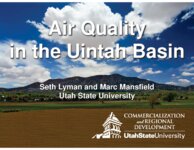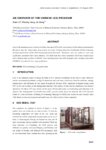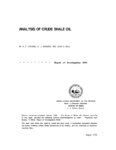TO
| Title | Date | Subject | Description | ||
|---|---|---|---|---|---|
| 176 |
 |
Age and sex population projections for Utah conunties: 1975-2010. (Low Medium Projection) | 2010 | ||
| 177 |
 |
Age and sex population projections for Utah conunties: 1975-2010. (Low Projection) | 2010 | ||
| 178 |
 |
Age and sex population projections for Utah counties: 1975-2010 | 1978-06 | ||
| 179 |
 |
Air quality in the Uintah Basin | 2013-05-07 | ICSE; Unconventional fuels; Air quality; Air pollution; Uintah Basin; Ozone; Pollutant concentrations; Inversions; VOC; Utah | Presentation given at the University of Utah Unconventional Fuels Conference, Salt Lake City, Utah, May 7, 2013. |
| 180 |
 |
AJ Eardley 1935 Diary | Geology; Yukon | Geology Prof. Armand Eardley (1901-1972) accompanied Frederica De Laguna on the archaeological expedition to Alaska in the summer of 1935. At that time, he was a professor at University of Michigan, before finishing his career at University of Utah (my institution), where he was also a dean. This wa... | |
| 181 |
 |
Ambient froth flotation process for the recovery of bitumen from tar sand | 1984-01-10 | Patent; Bitumen; Tar sand; Admixing raw tar sand; Tar sand slurry; Milling; Froth flotations; Ambient temperatures; Concentrated bitumen tar sand product; Oil; Recycle and recovery | A method for upgrading the bitumen content of tar sands, wherein a raw tar sand slurry admixture of tar sands, water, collectors, and dispersing/wetting agents is milled; conditioned and then separated by a series of froth flotations at ambient temperatures from about 2.degree. C. to about 25.degree... |
| 182 |
 |
America's oil shale: A roadmap for federal decision making | 2004-12 | Oil shale resources; Oil supply; U.S. economy; Domestic oil shale; Oil production; Multi-agency Federal oil shale plan; Energy; Interior; Defense; Treasury; America; Import dependence; Natural gas by-products; Oil price; Oil supply and demand | The President and the Department of Energy have determined that increasing liquid fuels supply from domestic sources is an important national objective. America's rich and concentrated oil shale resources, containing as much as 2 trillion barrels of potential oil supply could make a major contributi... |
| 183 |
 |
America's strategic unconventional fuels: Oil shale, tar sands, coal derived liquids, heavy oil, CO2 enhanced recovery and storage | 2007-09 | Colorado; Wyoming; Oil shale development; In-situ; Environmental impacts; Water supply issues; Economics; Socio-ecomonic impacts; Infrastructure; Market challenges; Programmatic Environmental Impact Statement; PEIS; RD&D; BLM; Leasing program; Federal lands; Oil Shale Program Plan; Energy Policy Act | The Task Force members from Colorado and Wyoming have expressed legitimate concerns about the timing and sequence of Federal efforts to promulgate commercial leasing regulations for oil shale development and initiate leasing activity. They are concerned that the current state of development of surfa... |
| 184 |
 |
American gilsonite: Mining solid hydrocarbon | 1985 | Gilsonite, a soft asphaltite found in near-vertical veins over a large area around Bonanza, Utah (Fig. 1), is mined by American Gilsonite Co. (AGC) using air-powered chipping hammers instead of explosives and mechanical equipment. A vacuum air lift moves 100,000 st/yr of ore to the surface through b... | |
| 185 |
 |
Ammonia for industrial combustion | ammonia combustion; hydrogen; methane | Many companies are investigating switching from conventional fossil fuels to "green" fuels such as hydrogen to reduce CO2 emissions. This assumes hydrogen is made by an environmentally-friendly method such as electrolysis using renewable energy. However, there are concerns with hydrogen. For example... | |
| 186 |
 |
An air-assisted flare for biomass gasifiers | 2019 | Computational fluid dynamics (CFD) was used to simulate the combustion practice of the gases that produce from gasification process. In this simulation a new air-assisted flare design which capable to handle low flowrates of these gases with high performance was used. The simulated cases were perfor... | |
| 187 |
 |
An analysis of cost improvement in chemical process technologies | 1989-05 | Chemical process technologies; Cost improvement; Chemical industry; U.S. | Cost improvement--sometimes called the learning curve or progress curve--plays a crucial role in the competitiveness of the U.S. chemical industry. |
| 188 |
 |
An analysis of land use in the Salt Lake, Ogden and Utah Valley Area transportation studies 1960 1970, and 1995 | 1972-12 | In early 1971, the Center for Business and Economic Research contracted with the Utah State Department of Highways to develop and apply a methodology for forecasting employment, population, dwelling units and various land use categories for the Salt Lake Area Transportation Study (SLATS), the Ogden ... | |
| 189 |
 |
An analysis of the tar sand deposit on the Rocky Mountain exploration company whiterocks federal lease Uintah County, Utah | 1982-11 | Rocky Mountain Exploration Company (hereafter called Rocky) of Salt Lake City, Utah, and Houston, Texas, holds a 240-acre federal combined hydrocarbon lease in Sections 17 and 18, T 2 N, R 1 E, UE5SM, Uintah County, Utah. The lease lies in the Ashley National Forest. Road distance is 27 miles north ... | |
| 190 |
 |
An assessment of oil shale and tar sand development in the state of Utah: Phase 1 | 1980-05 | Oil shale; Tar sand; Utah; Synthetic fuels; Tar sand development; Tar sand deposits | This assessment is the result of an interest and commitment by the State of Utah to both promote development of its vast energy resources and to manage the impacts associated with such development. As the development of Utah oil shale and tar sands became more imminent a specific proposal to study t... |
| 191 |
 |
An assessment of oil shale and tar sand development in the state of Utah: Phase 2--policy analysis | 1982 | Oil shale; Tar sand development; Utah; Synthetic fuels; Uintah Basin; Northeastern Utah; Petroleum reserves; Tar sand; Oil; Synthetic Fuel commercialization viability | The potential development of synthetic fuels in the United States has been characterized by a great variation in preceived economies. The interest has been on an upswing during the decade of the 1970's due to the possibility of synthetic fuels lessening U.S. dependence on foreign oil. However, even ... |
| 192 |
 |
An echoing in-situ combustion oil recovery project in a Utah tar sand | 1982 | in-situ combustion; oil recovery project; Utah tar sand; echoing in-situ; U.S. tar sand resources; reverse combustion process; heterogeneous tar sand reservoir | U.S. tar sand resources contain an estimated 30 billion bbl (4.7 Gm3) of oil in place in about 550 occurrences in 22 states. Over 90% of the known resources are in six large deposits in Utah, each containing from 1 to 16 billion bbl (0.15 to 2.5 Gm3) of oil. 1 Four major tar sand deposits in Alberta... |
| 193 |
 |
An evaluation of the extraction, transport and refining of imported crude oils and the impact on life cycle greenhouse gas emissions | 2009-03-27 | imported crude oils; life cycle of greenhouse gas emissions; greenhouse gas emissions; crude oil; GHG emissions | The National Energy Technology Laboratory (NETL) has analyzed the full life cycle greenhouse gas (GHG) emissions of transportation fuels derived from domestic crude oil and crude oil imported from specific countries. Estimates of the well-to-tank (WTT) GHG emissions associated with producing diesel ... |
| 194 |
 |
An evaluation of triple quadrupole ms/ms for on-line analyses of trace sulfur compounds from oil shale processing | 1985 | In order to effectively reduce sulfur gas content from shale processing to environmentally acceptable levels, H2S, COS, S02 and CH3SH plus trace sulfur compounds must be removed. Of these, the trace sulfur compounds have not been well characterized but should be known to ppm levels In order to optim... | |
| 195 |
 |
An experimental study on the thermal decomposition of catechol | 2002 | Thermal Decomposition; Catechol; Polycyclic aromatic hydrocarbons; PAH; Pyrolysis; ortho-dihydroxybenzene; Phenol decomposition; biomass; coal; wood; Kinetic model; Pyrolytic catechol decomposition; PAH formation and growth | In order to better elucidate the role of thermal decomposition products in the formation of polycyclic aromatic hydrocarbons (PAH) from complex fuels, we have performed pyrolysis experiments in a tubularflow reactor, using the model fuel catechol (ortho-dihydroxybenzene), a phenol-type compound repr... |
| 196 |
 |
An industrial development information system for Utah | 1969-12 | ||
| 197 |
 |
An overview of the Chinese UCG program | 2007-08-11 | Coal; China; Underground Coal Gasification; UCG; Two-stage gasification; Chinese UCG program; Energy | Coal is the dominant source of energy in China, but about 50% of the coal resource is left underground unmined. Because of this, the "long-tunnel, large section, two-stage" Underground Coal Gasification (UCG) technology has been put forward, and the UCG model platform has been built. Simulation test... |
| 198 |
 |
Analyses of oil extracted from oil-impregnated sandstone deposits in Utah | 1972-01 | This study, in progress from 1967 to 1970, is part of a systematic effort to find, map and sample Utah's oil-impregnated rock deposits. Samples were collected by ten individuals in field parties who examined oil-impregnated rock occurrences throughout the state. Samples 68-3A and 68-4A are from aban... | |
| 199 |
 |
Analysis of burner operation inside an enclosed ground flare | 2022 | Thermo-Acoustic Coupling; Enclosed Flare; LES CFD Model; Noise; Premixed Burner | An industrial enclosed ground flare used as part of a large refinery project has been analyzed to assess combustion stability and performance under low and high flow conditions. This flare includes a large combustion chamber directly above the burner deck with Low Flow (LF) burners that fire up to 9... |
| 200 |
 |
Analysis of crude shale oil | 1952-08 | A laboratory method for examining crude shale oil is described. The method uses only about 500 ml. of sample and a limited number of analytical determinations. Results provide information on the general characteristics and composition of an oil and serve as a basis for comparing different oils. Howe... |
